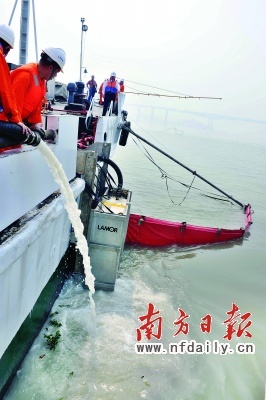|

The Guangdong Provincial Maritime Affairs Bureau conducts an emergency drill to retrieve spilled oil in the Pearl River Delta area. Nearly one third of the sea off Guangdong Province is seriously polluted, a situation that threatens to harm economic development in the area.
|
Nearly one third of the sea off Guangdong Province is seriously polluted, a situation that threatens to harm economic development in the area.
A report from the oceans and fisheries administration of Guangdong released yesterday said millions of tons of pollutants last year were dumped into the offshore areas through estuaries in the Pearl River Delta.
"If the situation becomes worse in the future, it will have a far-reaching negative impact on the economic development of the Pearl River Delta, which is the economic powerhouse of south China," said Li Zhujiang, director of the provincial administration of oceans and fisheries.
The report found more than 10,620 sq km of offshore marine area was polluted last year, up 14 per cent from the previous year.
"The Pearl River Delta has been the most seriously polluted area in the past six years, and our long-term inspections have found the situation is deteriorating," Li said.
At least 2 million tons of pollutants and 6.1 million tons of sewage were discharged into the ocean from eight major estuaries of the Pearl River Delta last year, he added, including chemicals such as active phosphate and inorganic nitrogen, plus other suspended matters.
"Most of the chemicals come from sewage," Li said, adding that among the 14 coastal cities in the province, 13 of them exceeded their guidelines for sewage discharge.
Such levels of pollution are starting to hurt the aquatic industries of the coastal cities in Guangdong, Li said.
The province was hit 10 times by red tide, a harmful increase in algae often caused by agricultural run-off from human activities. Damage from the red tides affected an area of 230 sq km.
He said the coastal waters of Guangzhou, Dongguan, Zhongshan, Shenzhen and Zhuhai have become seriously polluted. To improve the quality of the ocean, Li said the administration will set up a large number of artificial fish reefs over the next three years to promote marine life.
They will also build several natural protective zones in the ocean to protect the water and marine life, and encourage all coastal cities to establish more mangroves, sea meadows and coastal wetlands.
Finally, cities will be compared and the best and worst among them will be announced in an effort to push them to protect the ocean, Li said.
(China Daily May 27, 2009)